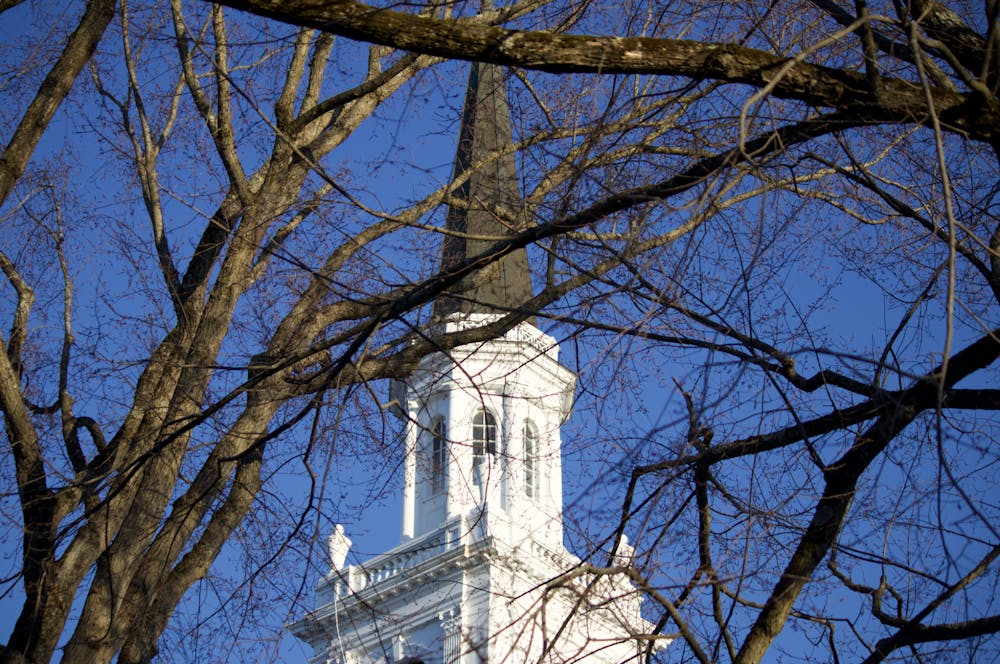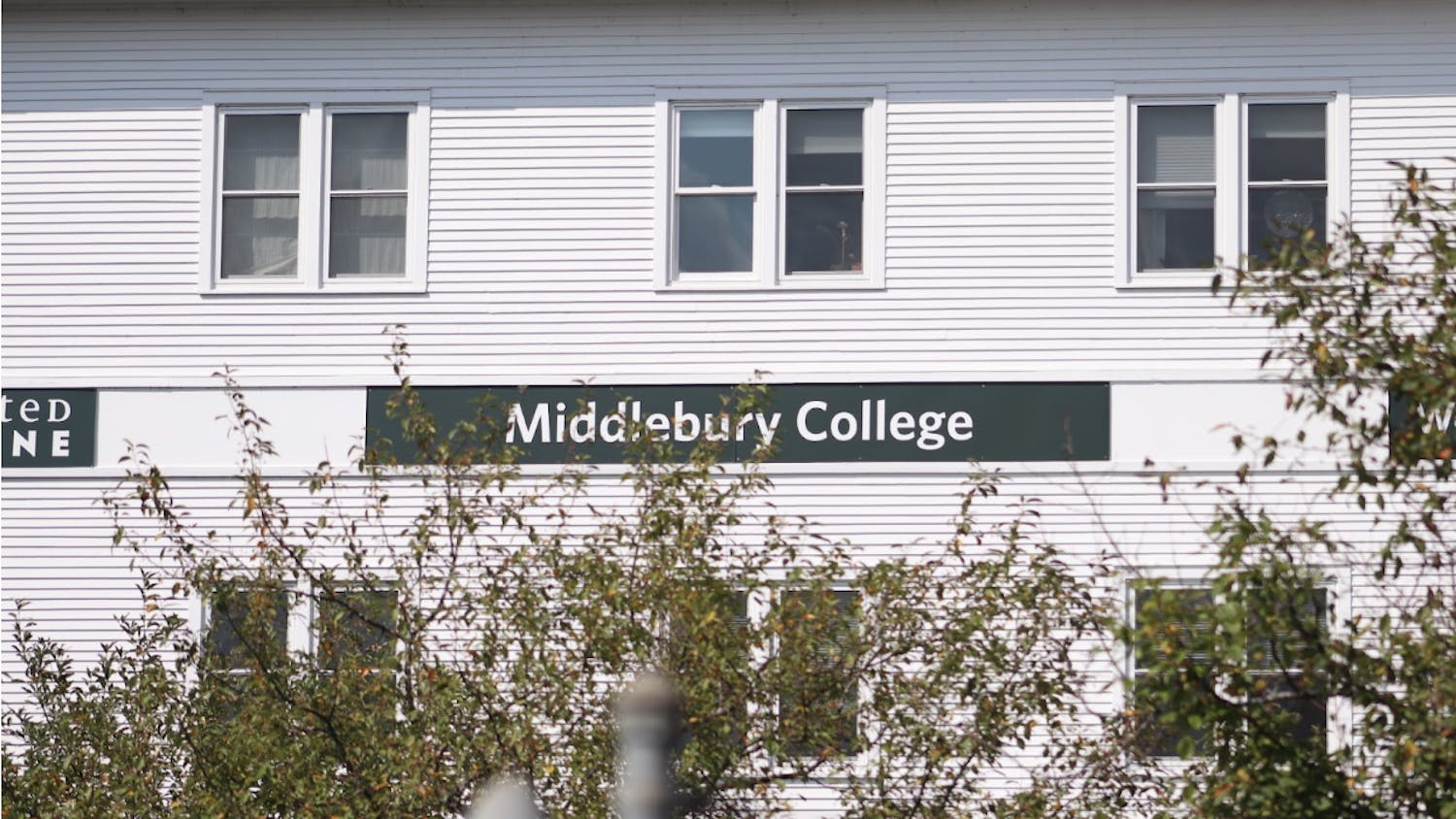Former Vermont Governor and executive in residence at the college, Jim Douglas ’72, filed a lawsuit against the college on Friday March 24, contesting the removal of the “Mead Memorial Chapel” name from the building. The decision that the chapel would no longer bear the name of John A. Mead was enacted in September 2021, due to Mead’s role in advocating and promoting eugenics policies in Vermont in the early 1900s.
After the college’s decision last year, Douglas said he twice asked the college administration to reconsider to no avail. Now, he has been appointed Special Administrator of the Estate of John Abner Mead and is suing the college as a representative of the Mead family.
The lawsuit
The 79-page complaint was filed by Douglas at the Vermont Superior Court, Addison County division. According to Douglas, the family of Mead contacted him soon after the college’s decision to remove Mead’s name.
The lawsuit claimed that the removal of Mead’s name is a breach of contract. In a series of letters between Mead and Rev. Dr. John M. Thomas, who served as president of the college from the early 1910s, Mead requested that the chapel be known as “Mead Memorial Chapel” and paid $75,373.34 for the construction of the chapel, which is equivalent to $2,237,058.12 in today’s money.
“The most essential argument is, Governor Mead gave the college a chapel and now the college is essentially taking it away,” Douglas told the Campus.
Douglas also claims in the lawsuit that the college has benefited tremendously from the chapel in intervening years. The chapel has hosted numerous convocations, baccalaureates, student performances and regular religious services. As a prominent feature of the Middlebury skyline, the image of the chapel frequently appears on the college’s promotional materials.
According to Douglas, the Mead family is not seeking monetary compensation. The goal is to restore Mead’s name to the chapel, thereby re-establishing the integrity of the gift and the reputation of Mead.
“We feel that it is a real miscarriage of justice and completely unfair to him and to his legacy,” Douglas said.
Cancel culture
Douglas’ complaint hinges on his grievances over cancel culture. According to Douglas, the accusations of Mead’s role in the eugenics movement are not representative of the entirety of Mead’s legacy. For Douglas, the erasure of Mead’s name “canceled” Mead and disparaged the family name.
The college’s email to the community cited Mead’s farewell speech as governor in 1912 to demonstrate his promotion of policies and legislation premised on eugenics theory, which was used as evidence to show that his actions counter the values of the college as an institution.
“John Mead is a lot more than a couple of paragraphs in a 1912 speech, I think that is my biggest complaint about this,” Douglas said. “It’s important to humanize him since [the college] put out a press release in 2021 basically calling him a racist, without using the word but implied it. He joined the union army when he was still in college. He was anything but racist, he was fighting slavery. That is just offensive and we want to call [the college] out on that.”
Douglas previously expressed his dismay over cancel culture at the college in an article published in The New York Sun when he boycotted his 50th reunion at the college.
“It’s not fair, things change. Our values change and our sensibilities change. I think everybody has to understand that it was a different era. Governor Mead’s views, although [students] might not find them palatable today, were quite mainstream,” Douglas said.
According to Charles A. Dana Professor of Political Science Erik Bleich, the phrase “cancel culture” has evolved over time, and is typically used as a complaint and is not a legal term. It typically refers to the ostracizing of someone from the community for something they have said. Its use as a complaint in reference to removing names from buildings is less common but not unprecedented.
The term is not free from political associations. “It is a term more commonly used on the right of the political spectrum to complain about actions coming from the left,” Bleich said, “Firing someone, deplatforming someone, removing statues or names from a building because of racist, sexist, or homophobic statements — the right typically complains loudly about those sorts of steps.”
In Bleich’s view, the removal of a building’s name does not equate to a person’s complete erasure from the history of the institution.
“If a building loses its name or statue gets removed, it doesn't make that person less important to the history of the institution, but it means that the memory of that person is less visible in the daily lives of the people on that campus,” Bleich said.
Former journalist at the Burlington Free Press Kevin Ellis, who followed Douglas’ political career since the early 2000s, was disappointed to see Douglas claim the name removal was an instance of cancel culture in the article and now the lawsuit. Instead of engaging in serious conversations and education, Ellis said Douglas is opting for the “intellectually easy” route.
“He grew up, as did I, in an America that was safe, protected and privileged for white men,” Ellis said. “We grew up in a system designed for us and by us. People of color, LGBTQ, marginalized people at every level are saying, ‘we don’t like that system and we would like to change it.’ Instead of engaging with those people on serious issues, he chooses to publish his one-shot commentary.”
Douglas’ complaint also notes the college’s lack of transparency during the process of removing Mead’s name from the chapel. “The College issued no warning that the name would be removed, held no public discussion and offered no hint that such a dramatic change would occur,” he wrote in the legal complaint.
According to the email sent out by the college after the name was taken down, the decision was advised by a working group for the President to recommend to the Board of Trustees to remove “Mead” as part of the building’s name. Following the college’s protocol, the recommendation was forwarded to the Prudential Committee of the Board of Trustees who has the authority to act on behalf of the full board. The Board voted unanimously to remove Mead’s name.
In Bleich’s view, freedom of speech allows the administration to listen to input and debate from both sides of the argument, and make a political consideration for the institution.
“Freedom of speech is happening on both sides as these issues are being debated,” he said. “The administration makes a decision not based on freedom of speech but based on other considerations, more political considerations.”
The governors’ legacies
Douglas and Mead, both graduates of the college and both former Vermont governors, share stark similarities in their careers. Douglas said that as one of few men who have held the gubernatorial office in the state, he feels a personal connection to Mead.
Douglas’ own legacy is not free from controversy: as a moderate Republican governor, he stood in opposition to the overwhelmingly liberal Vermont legislature at the time. In 2009, Douglas vetoed a bill to legalize same-sex marriage, which the Senate voted 23–5 and the House voted 100–49 to override.
In response to whether the “cancellation” of Mead threatens the preservation of his own legacy, Douglas said, “At the time, both Clinton and Obama agreed with me, but times change. Times have changed since Mead’s time too. Who knows what people will do a century later?”
According to Ellis, the lawsuit is consistent with Douglas’ position against gay marriage, and speculates that it is an attempt for Douglas to position himself in the future of the Republican party.
“I think his greater agenda is to protect a system that protected him and empowered him, and he is afraid of that system eroding and his power going away. Now the people who were marginalized by that system are angry and they want to be treated equally and fairly, and he can’t deal with it,” Ellis said. “That was symbolized in stark reality by his veto of the same-sex marriage bill that was overwhelmingly approved by the Vermont legislature and favored by the people of the state.”
When asked if the lawsuit serves a greater national agenda, Douglas said he does not see this as a partisan issue. He is currently a member of the Governor’s Council for the Bipartisan Policy Center where he co-chairs the task force for Campus Free Expression. The task force published a report that provides a roadmap for leading institutions facing the erosion of a campus culture of free expression and open inquiry.
Teaching at the college
Douglas has been the most outspoken advocate at the college for restoring Mead’s name. Douglas said his action will benefit the Middlebury community through educating the students using knowledge about history rather than the erasure of it.
Douglas was appointed as executive in residence at the college in 2010. Most recently, he co-taught the first year seminar American President Biography with Professor of Political Science Matt Dickinson and a J-Term class on Vermont Politics. He was also the advisor to the College Republicans club on campus, but the organization is not currently active.
Cody Mattice ’24 has taken two classes with Douglas at the college. According to Mattice, Douglas’ role is to provide a personal perspective on the issues discussed in class through his own career in politics. Mattice said Douglas fosters a classroom environment that encourages free discussion.
“In my experience as a student I feel like you can talk to him about these things,” Mattice said. “In the context of our seminar we had a lot of debates as well and things weren’t being shut down.”
However, Mattice said the lawsuit has changed his previous perception of Douglas as a teacher.
“This very much changes how I see Governor Douglas. This was not something I thought he would do, and the fact that he is taking this conservative ‘culture warrior’ stance surprises me,” Mattice said. “It surprised me that this is something he would take legal action over, it seems out of character to me.”
Douglas said he does not espouse political views in class and believes his classes provide educational opportunities that are apolitical.
In response to the suggestion that students may be uncomfortable with Douglas’ political views, he said, “My record is pretty open, so if students don’t want to know about it, they can decide not to take the class. It’s not mandatory.”
Nevertheless, Douglas expresses dissatisfaction with the presence of a predominantly liberal student body at the college and broadly in the state of Vermont.
“I wish it was more balanced, to be perfectly honest, and I wish too for the faculty and the administration. I think communities are better when they are more diverse, and I’m starting to feel that way about Vermont in general. It’s changed so much. I think communities would be stronger, more vibrant, more successful if they were more diverse,” Doulgas said. “Diverse ideologically,” he added.
Ellis questions whether Douglas’ presence at the college is contradictory to his stance in the lawsuit.
“If he believes this [the lawsuit], then why is he still teaching at Middlebury College?” Ellis said. “Why is he still accepting a paycheck from the college? If he was principled about this, he would resign, and he hasn’t done it.”
Douglas is not currently teaching a class this semester, but he is active on the college campus as an executive in residence. He is scheduled to teach a first year seminar with Dickinson next fall.
The college’s role in the Eugenics Movement
Amidst discussions over the lawsuit, an examination of Mead’s role in eugenics and the college’s involvement in the movement and other structural forms of injustices have fallen by the wayside. Professor of Gender, Sexuality, Feminist Studies Laurie Essig, who refers to the Chapel as “the Chapel formerly known as Mead,” said the college failed to take the opportunity to engage in widespread discussions over the legacy and impact of the eugenics movement.
Aside from the initial September 2021 email sent to the community detailing the decision to remove Mead’s name, the college has not otherwise opened discussion on the eugenics movement.
“What’s more interesting to me than Jim Douglas’ claims, is that eugenics were and are very central to the way in which American elites saw and see the world,” Essig said. “Eugenics didn't just go away, it’s still here. Not having that conversation seems like a lost opportunity, as a community and as an educational center, to talk about what eugenics were and how that continues to structure much of our thinking.”
Mercedes de Guardiola is a New York-based innovation and strategy consultant and historian; her article “Segregation or Sterilization: Eugenics in the 1912 Vermont State Legislative Session” was published in Vermont History. In her research, De Guardiola named Mead as a strong advocate for eugenic policies in Vermont.
“By Governor Mead's speech in 1912, public policy in Vermont was failing: Vermonters were sent to poor farms or overcrowded and underfunded state institutions, including the mental asylum and the juvenile penitentiary,” De Guardiola told the Campus. “Mead decided the crisis was a problem of heredity, not a failure of public policy, and, after two years of research, as governor advocated strongly for eugenics.”
De Guardiola’s research found that Mead proposed eugenical marriage restrictions, segregation and sterilization, which solidified the foundations for Henry F. Perkins’ Eugenics Survey of Vermont (1925–1936) and led to Vermont’s legalization of voluntary eugenical sterilization in 1931.
Mead was the first to introduce eugenics as public policy in Vermont, and publicly voiced the fear over increased “degeneracy” in the state while suggesting a direct hereditary link for mental illnesses.
Mead proposed that the “defective class” may be transmitted to offspring. He said, in his 1912 farewell speech when he was departing the governorship, “That this class is prolific, knowing no law of self-restraint, and consequently defectives are increasing in numbers and are of a more pronounced type. What can be done to protect society from these unfortunates and what to protect them from themselves?”
According to De Guardiola, eugenics was a cornerstone of public policy at a local, state and national level in America well into the late 20th century. American institutions of higher education including Yale, Harvard and Stanford were leaders in the eugenics movement.
In an op-ed published in The Campus, Associate Professor of Luso-Hispanic Studies Daniel Silva presented research findings on Middlebury’s role in eugenics. For the first decade of the 20th century, eugenics emerged in the college’s course offerings in departments such as Pedagogy (later renamed Education and Psychology), Biology and Sociology. In the course catalog of 1913, eugenic ideas could be found in the descriptions of courses such as “Genetics and Embryology,” “Social Psychology” and “Educational Psychology,” and almost the entire course offering in the Sociology department. This trend follows the academic mainstream at most universities in North America and Europe.
“It is, therefore, not a stretch to consider that eugenicists and eugenics sympathizers, were, to some degree, trained at Middlebury,” Silva wrote.
The legacy of eugenics also sheds light on the history of systematic displacement and exploitation. “History does not exist in a vacuum: It is helpful to understand the issues we face today and in the future — such as homelessness and mental health — by studying the decades-long history of eugenics,” De Guardiola said.
This includes conversations surrounding Middlebury’s role in colonial history, problems with accessibility and the decolonization of its curriculum. Essig suggested that the college should host a conference on eugenics at Middlebury with events, speakers and documentaries to engage the community in conversation.
“I don’t think that taking the name off did the educational work of talking about eugenics. All of us who live at Middlebury benefit from the exploitation of those systems, whether it's the possession of land from native people, or white supremacy, or the economic effects of slavery,” Essig said.
Due to ongoing litigation, the college administration was unable to comment.
Correction 04/08/2023 10:50 a.m.: A previous version of this article misspelled the first name of Charles A. Dana Professor of Political Science Erik Bleich.This error has been corrected. This article has also been updated to clarify the definition of cancel culture provided by Bleich.




